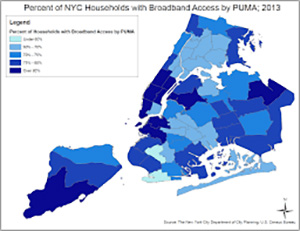By: Hellen Zaboulani
Mayor Bill de Blasio has long vowed to pursue better broadband internet access for all NYC residents. This promise has been slow in implementing, and now with the pandemic, internet access has become even more important, as online meetings have gained a prominent and vital position in schools and offices alike.
Now, in the Mayor’s last year of tenure, his administration is amplifying efforts to expand affordable high speed internet. The main part of this undertaking is to add players to the broadband markets, increasing competition between providers and thereby pushing them to provide better service, lower prices, and expand service to those who do not have internet.
As reported by Crain’s NY, on Thursday, the NYC council voted to back a bill to allow more broadband licenses, and to actively solicit new franchise agreements, where companies will build the infrastructure required to add internet to underserved communities. The agreements would tap broadband firms to pay for and maintain infrastructure. As per Granthshala News, the bill says that the companies would be on the hook to provide affordable pricing and the city will have security deposits which they can deposit if the providers don’t live up to the agreements. Details of the agreements will be published in early 2021.
Currently, the broadband market is dominated by only three providers: Charter’s Spectrum, Altis’s Optimum and Verizon’s Fios. Over 1.5 million New Yorkers still do not have broadband in their homes. The mayor was recently slapped with a lawsuit on behalf of students who live in NYC homeless shelters and who don’t have reliable internet service with which to attend school remotely.
In July, Mayor de Blasio had announced that the city is reallocating $157 million in NYPD funding and other city funding to add low-cost internet service for public housing residents and other low-income residents. “For so many New Yorkers, there just isn’t access. That digital divide is very, very intense,” de Blasio had said. “The internet companies have not attended to lower-income communities,” Hizzoner added. “It’s unfair. It’s not respectful of communities that have such great need, and we have to do something about that.”
The broadband industry will be closely eying the city’s new broadband agreements, said Shrihari Pandit, CEO and founder of the independent broadband provider, NYC-based Stealth Communications. “It will depend on how the franchise agreements are written,” Pandit said, “but it may appeal to residential broadband expansion for many new immigrants.”





